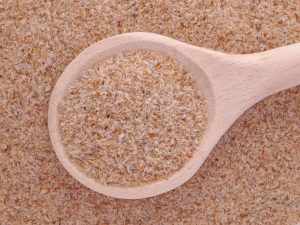 Psyllium is the common name used for several members of the plant genus Plantago whose seeds are used commercially for the production of mucilage.
Psyllium is the common name used for several members of the plant genus Plantago whose seeds are used commercially for the production of mucilage.
The genus Plantago contains over 200 species.
Psyllium is mainly used as a dietary fiber to relieve symptoms of both constipation and mild diarrhea, and occasionally as a food thickener.
Allergy to psyllium is common in workers frequently exposed to psyllium.
Use of psyllium in the diet may lower blood cholesterol levels in people with elevated cholesterol,
It lower blood glucose levels in people with type 2 diabetes.
Its use for a month or longer may produce a small reduction in systolic blood pressure.
The plants from which the seeds are extracted tolerate dry and cool climates, mainly cultivated in northern India.
Psyllium has been used as a thickener in ice cream and other frozen desserts.
1.5% weight/volume ratio of psyllium mucilage exhibits binding properties that are superior to a 10% weight/volume ratio of starch mucilage.
Psyllium seed husks can also be used to improve texture in gluten-free baked goods, to bind meatballs, and to thicken sauces.
Psyllium seed husks can also be used to to manage symptoms of irritable bowel syndrome, or to maintain a clean colon for receiving anal sex.
Dietary supplements containing psyllium are sold mainly to aid weight loss, with little evidence for such effects.
Psyllium is mainly used as a viscous, soluble dietary fiber that is not absorbed by the small intestine.
Psyllium mucilage mechanical,action is to absorb excess water while stimulating normal bowel elimination.
Its main use has been as a laxative.
it is regarded as a dietary fiber and as such can help reduce the symptoms of both constipation and mild diarrhea.
Psyllium absorbs water and subsequently softens the stool.
It increases flatulence to some degree.
Seven grams or more per day of soluble fiber from psyllium seed husk sufficiently lowers total cholesterol and low density lipoprotein cholesterol in people with hypercholesterolemia, two accepted biomarkers for risk of coronary heart disease.
A meta-analysis reported that psyllium provided before meals improved fasting blood glucose and glycated hemoglobin, but that the larger effect was seen in people diagnosed with and being treated for type 2 diabetes, and only a modest improvement for people classified as pre-diabetic.
Psyllium has been found by meta-analysis of clinical trials to significantly reduce blood pressure in people suffering from hypertension, but has not been shown to have the same effect on individuals with normal or elevated blood pressure.
Psyllium fiber generally has few side effects, but can cause bowel obstructions or bezoars, if taken without adequate amounts of water.
Gas or stomach bloating may also occur, with psyllium.
Psyllium can cause allergic reactions, including anaphylaxis, and is
as a potent inhalant allergen capable of eliciting asthma symptoms.
Health care professionals frequently exposed to psyllium in laxatives administered to patients, are commonly IgE sensitized to psyllium (13.8%), and 8.6% have clinical allergy to psyllium.
Pharmaceutical manufacturing employees exposed to psyllium during the processing have developed occupational asthma and IgE sensitization.
Psyllium is produced mainly for its mucilage content: clear, colorless, gelling agents derived from plants.
The mucilage obtained from psyllium comes from the seed coat, and is obtained by mechanical milling of the outer layer of the seed.
Upon absorbing water, the clear, colorless, mucilaginous gel that forms increases in volume by tenfold or more.
Metamucil is sold as powdered drink mixes, capsules and wafers in a variety of flavors.
Metamucil contains psyllium seed husks as the active ingredient.
